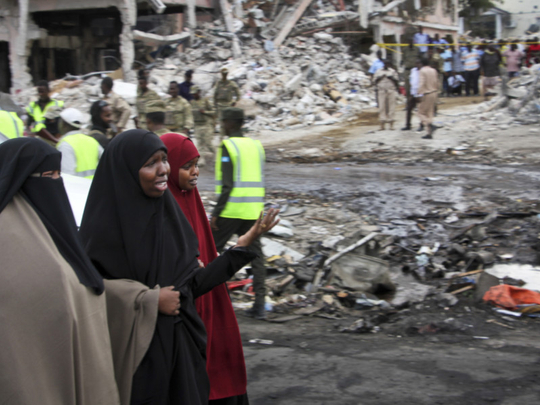
MOGADISHU, Somalia: The deadly truck bomb on Saturday in Mogadishu which killed over 270 people and injured 300 could be a response by Al Qaida-linked Al Shabab militants to US President Donald Trump’s renewed push to defeat the terrorist group in Somalia.
The Somali-based militants have terrorised the country and East Africa for years, killing civilians across borders, worsening famine and destabilising a broad stretch of the region.
While no one had yet claimed responsibility for the bombings, suspicion immediately fell on the group, which frequently targets the capital, Mogadishu.
Al Shabab—which once controlled most of the city—has lost much of its territory in Somalia in recent years, the result of attacks by African Union forces, a fitfully strengthening Somali army and increasing US air power. But the group remains a potent killing force, despite years of US counterterrorism operations.
Hopes for Somalia tend to ebb and flow after more than 25 years of chaos since its central government collapsed. In recent years, there has been a bit more optimism with a new government in power.
Still, in the fragile world of Somali politics, the threat of Al Shabab never went away. Hundreds of people have been killed or wounded in attacks on the capital this year alone.
Analysts thought the latest attack might have been in retaliation both for the loss of territory and for increasing US drone attacks since Trump loosened restrictions meant to strictly limit civilian casualties.
Counterterrorism specialists said the size of the bombings Saturday, which were well beyond what Al Shabab has conducted before, suggested that the group might have received help from operatives with the Al Qaida arm in Yemen.
“When the group feels under pressure, it lashes out with more significant attacks,” said Tricia Bacon, a Somali specialist at American University in Washington and a former State Department counterterrorism analyst. She called the attack “a bad miscalculation” by Al Shabab that will likely shore up public resolve for the government’s commitment to fighting the militants.
US officials condemned the Mogadishu bombings, calling them “cowardly attacks” that “reinvigorate the commitment of the United States to assist our Somali and African Union partners to combat the scourge of terrorism.”












